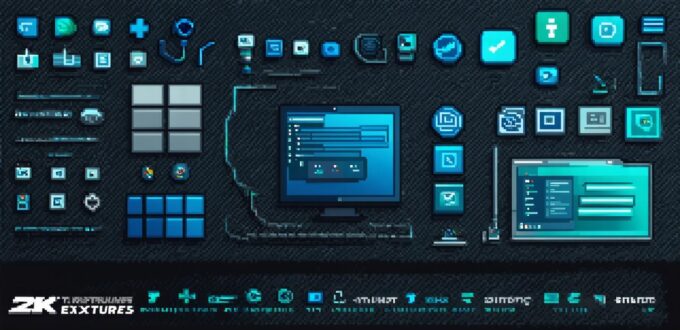As computers become increasingly indispensable in our daily lives, it’s essential to have the right software installed on your machine. Whether you are a software developer, a student, or just an average user, having the right tools can make all the difference. In this article, we will explore ten different kinds of software that every computer should have. We will also discuss their features, benefits, and how they work together to create an optimal computing experience.
1. Operating System: The Backbone of Your Computer
An operating system (OS) is the foundation upon which all other software is built. It manages computer hardware resources and provides common services for computer programs. Some popular operating systems include Windows, macOS, and Linux. Each OS has its strengths and weaknesses, so it’s essential to choose one that suits your needs.
2. Productivity Software: Boost Your Efficiency
Productivity software includes applications like word processors, spreadsheets, and presentation software. These tools are designed to help you create and edit documents quickly and efficiently. Microsoft Office is a popular productivity suite, but there are many other options available.
3. Multimedia Software: Bring Your Creativity to Life
Multimedia software includes applications for creating music, videos, and graphics. These tools allow you to express your creativity and create stunning visual and audio content. Adobe Creative Suite is a popular multimedia suite, but there are many other options available.
4. Web Browsers: Explore the World Wide Web
Web browsers allow you to access and navigate the World Wide Web. Google Chrome, Mozilla Firefox, and Microsoft Edge are some of the most popular web browsers. Each browser has its features and benefits, so it’s essential to choose one that suits your needs.
5. Email Clients: Stay Connected with Ease
Email clients allow you to manage and send emails from your computer. Gmail, Outlook, and Thunderbird are some of the most popular email clients. Each email client has its features and benefits, so it’s essential to choose one that suits your needs.
6. File Management Software: Keep Your Files Organized
File management software allows you to organize and store files on your computer. Dropbox, Google Drive, and OneDrive are some of the most popular file management services. Each service has its features and benefits, so it’s essential to choose one that suits your needs.
7. Antivirus Software: Protect Your Computer from Threats
Antivirus software protects your computer from malware and other threats. McAfee, Norton, and Avast are some of the most popular antivirus software options. Each antivirus software has its features and benefits, so it’s essential to choose one that suits your needs.
8. Graphics Drivers: Optimize Your Gaming Experience
Graphics drivers allow you to optimize your computer’s graphics performance, especially for gaming. Nvidia and AMD are two of the most popular graphics card manufacturers. Each manufacturer has its drivers, so it’s essential to choose one that suits your needs.
9. System Utilities: Maintain Your Computer’s Performance
System utilities allow you to manage and maintain your computer’s performance. CCleaner, Malwarebytes, and Speccy are some of the most popular system utilities. Each utility has its features and benefits, so it’s essential to choose one that suits your needs.
- Virtual Assistants: Save Time with Automation
Virtual assistants allow you to automate repetitive tasks and save time. Siri, Alexa, and Google Assistant are some of the most popular virtual assistants. Each virtual assistant has its features and benefits, so it’s essential to choose one that suits your needs.
Case Study: How Productivity Software Can Transform Your Business
As a software developer, productivity software can transform your business by streamlining your workflow and increasing efficiency. For example, using a word processor like Microsoft Word or Google Docs can help you create professional-looking documents quickly and efficiently. Using a spreadsheet program like Excel or Google Sheets can help you analyze data and make informed decisions.
Moreover, productivity software can also help you collaborate with your team more effectively. For example, using project management software like Trello or Asana can help you track progress and ensure that everyone is on the same page. Using real-time collaboration tools like Google Drive or Dropbox can also help you work together seamlessly.
FAQs
1. What is an operating system?

An operating system is the foundation upon which all other software is built. It manages computer hardware resources and provides common services for computer programs.
2. What is productivity software?
Productivity software includes applications like word processors, spreadsheets, and presentation software. These tools are designed to help you create and edit documents quickly and efficiently.
3. What is multimedia software?
Multimedia software includes applications for creating music, videos, and graphics. These tools allow you to express your creativity and create stunning visual and audio content.
4. What is a web browser?
A web browser allows you to access and navigate the World Wide Web.
5. What is an email client?
An email client allows you to manage and send emails from your computer.
6. What is file management software?
File management software allows you to organize and store files on your computer.
7. What is antivirus software?
Antivirus software protects your computer from malware and other threats.
8. What are graphics drivers?
Graphics drivers allow you to optimize your computer’s graphics performance, especially for gaming.
9. What are system utilities?
System utilities allow you to manage and maintain your computer’s performance.
- What are virtual assistants?
Virtual assistants allow you to automate repetitive tasks and save time.
Summary
In conclusion, having the right software installed on your computer can make all the difference in your productivity, efficiency, and overall computing experience. Whether you are a software developer or just an average user, it’s essential to have the right tools to help you achieve your goals. By understanding the different kinds of software found on computers, you can choose the right applications that suit your needs and take your computing to the next level.
